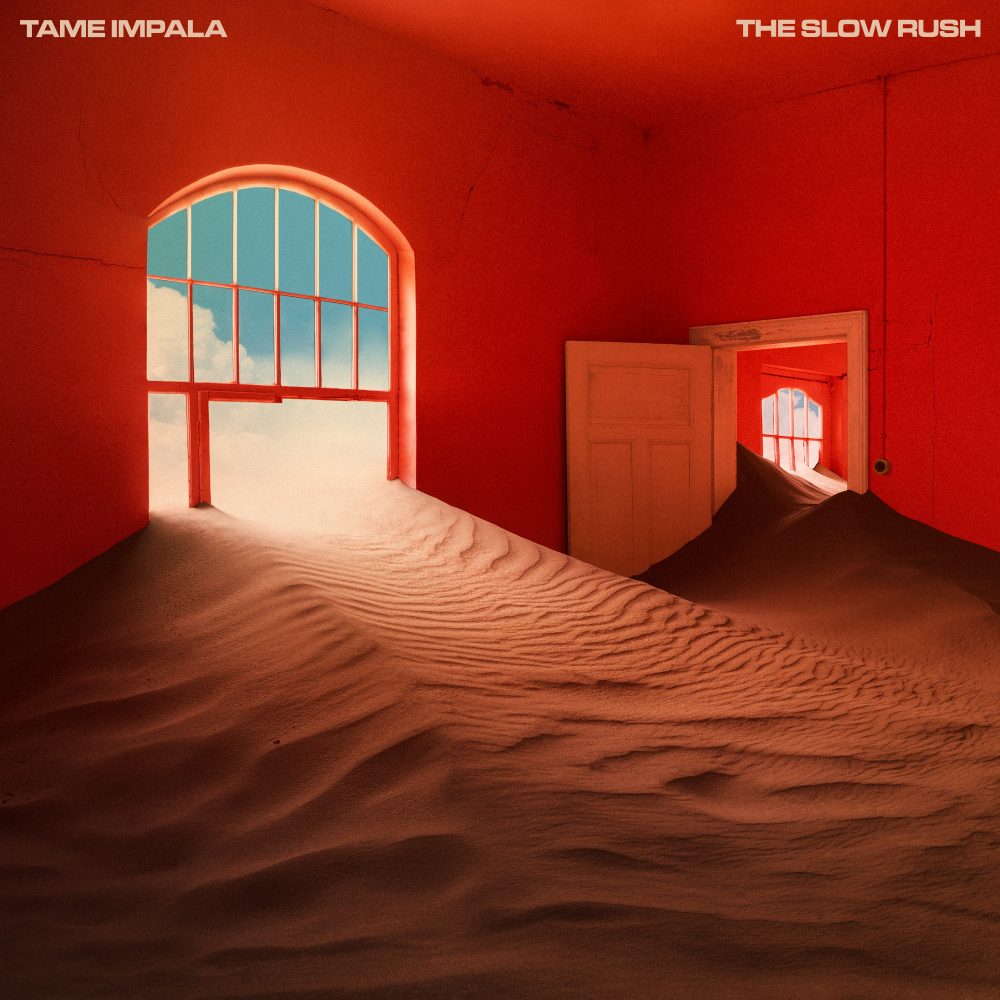The passage of time. How the past shapes us, haunts us and how we can refuse to let it go. How temporary the actions of the present are and how they can affect the future. Kevin Parker is both philosophical and heartfelt about the subject of time on Tame Impala ambitiously-produced, eclectic and absorbing new album The Slow Rush. With Parker’s vocals maintaining their sensitive charm, the Australian analyses the notion of time also with a passionate personal touch. To immediately highlight the horology on Parker’s mind, you can see on the album cover of the oxymoron-titled The Slow Rush showing sand filling a house like a hour glass and the fact that the record is bookended by the song titles ‘One More Year’ and ‘One More Hour’ .There’s also an abundance of surprising influences on their fourth record that develop that takes their distinctive-yet-unrestricted take on psychedelic rock to new and enjoyable levels.
Along with the regular inclusion on bongo drums on numerous tracks – the funky Daft Punk-influence ‘Is It True’ being the best use of this of those drums – one of the other noticeable instrumental fascinations on this album is the different uses of piano and keys. The epic closer ‘One More Hour’– which uses its seven minute time (although it magically doesn’t feel that long) to create a slow-building progressive rock landscape, as Parker thinks about the future with a sense of gratitude for the past – adopts the Supertramp-famed Wurlitzer keyboard. It’s also used on single ‘It Might Be Time’ but on that occasion it’s overshadowed by a miscalculated overuse of irritating sirens, one of the only bad production moments along with the seemingly random lazer sounds on ‘Lost In Yesterday’, a song which urges listeners to let go of the past and uses an example of a deceased friend to encourage life-embracing.
Other interesting uses of piano are on ‘On Track’, in which we are taken into both the world of a Meat Loaf stadium rock anthem and into the setting of a communal Christian church. In ‘Breathe Deeper’ the piano is performed with a 1990’s house spirit, although the track has a shimmering and friendly 1990’s R&B sound that’s influenced by Mariah Carey and Pharrell Williams. The track that’s about Kevin Parker trying to calm himself down in uncomfortable situation is one of many tracks that shape-shifts with the outro being an experimental synth frenzy. Another example of the house piano vibe is on the 2-minute interlude ‘Glimmer’ – wonderfully smokey in its production and reminiscent of Underworld’s ‘Born Slippy’, it’s both Trainspotting and the soundtrack to a coming-of-age film set in the 1990’s. Something that could also be said about The Slow Rush’s opener ‘One More Year’, especially when he talk-sings in a slight Kasabian-way: “Got a whole year, fifty-two weeks. Seven days each. Four reasons, one reason, one way” like a motivational speech at the end of The Breakfast Club. The hook in the song is an echoey yet weirdly soothing rippling voice effect that Parker has called “gregorian robot choir” in an interview. It swirls behind a groove that’s New Order, Friendly Fires and Real Lies rolled into one.
This song, like many others in on the album, is actually inspired by his marriage last year to partner Sophie Lawrence. “I never wanted any other way to spend our lives. I know we promised we’d be doing this ’til we die”. The succeeding track ‘Instant Destiny’ – a track with fuzzy retro drums and glacial keys – also documents this relationship but talks about marriage as a way to trap an aspect of time. Controlling and guaranteeing a future. While many things are impermanent, at least this could be eternal to him. “Did you say ‘And here comes forever?’ Oh here forever, let go of me with open arms.” Parker has displayed his suffering from loneliness in the past and this gives him encouragement. ‘Tomorrow’s Dust’ – which is a great example of Tame Impala’s use of mono-stereo perspective to give the record a multi-dimensional experience, as it features a girl talking on the phone in a nightclub toilet whilst Tame Impala can be heard in the background – also talks philosophically about the present as being a temporary state. “I was blind by your memory. Like it’s someone else, like it wasn’t me. And a second chance, I’ll be better then. And the day will come and then it will pass.” Its genre-blending of summery Erlend Øye acoustic folk with glam rock fuzz and Pond space-psychedelia make it one of the many pleasant listening experiences on The Slow Rush.
However, one of the most important tracks on their new LP is undeniably ‘Posthumous Forgiveness’. It has to be one of the most personal and transparent tracks that Parker has ever written for Tame Impala. The sentimental song is the Syndeysider contemplating whether to forgive his father’s behaviour after his death in 2009. Thinking back to his childhood and when his illusion of the perfect family structure was shattered (his parents got divorced at 4): “Ever since I was a small boy. No one else compared to you, no way. I always thought heroes stayed close. Whenever troubled times arose. Every single word you told me. I believed without a question, always. To save all of us, you told us both to trust. But now I know you only saved yourself.” The song is split into two halves to show two different mindsets, beginning with a 1960’s psychedelic vibe with moments of knocking bass and flanging effects to give it an intensity and a symbolism of anger, before bongo drums introduces a more mellow atmosphere as Parker starts to show mercy towards his paternal parent.
The album has lots of rewarding surprises. Even ‘Borderline’ , which isn’t new for Tame Impala fans – having been released as a single last April – the album version gives it a new lease of life. An added oomph when it experiments with the pan flutes more and dials up the fuzzy bass. Due to the phrasing of the chorus, it seems to display the two sides of Kevin Parker’s outlook on life, the self-deprecated and the motivational, as he cautiously attempts to enter a new chapter in his life : “Little closer, close enough. I’m a loser, loosen up. Set it free, must be tough.”
And The Slow Rush really feels a cathartic exercise for Kevin Parker, his new marriage is replacing his previous pessimism with a coat of optimism and by the end of the album he has won his battle with the past and time itself. As he put it beautifully and philsophically in an interview with Zane Lowe: “The time has come. Nothing left to prepare. Nothing left to worry about. Nothing left to do but sit and observe the stillness of everything as time races faster than ever. Even shadows cast by the sun appear to move. My future comes to me in flashes, but it no longer scares me. As long as I remember what I value the most.”




